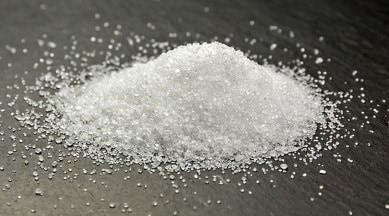📣 For more lifestyle news, click here to join our WhatsApp Channel and also follow us on Instagram
Study links this artificial sweetener to blood clots, stroke, heart attack and death; know more
Erythritol, just like sorbitol and xylitol, is a sugar alcohol that is naturally found in many fruits and vegetables

Artificial sweeteners have come to occupy immense prominence considering the various advantages they have been associated with — weight loss, no sugar spike, and mimicking the taste of sugar minus the calories. However, a new study published in Nature Medicine suggested that erythritol, a popular sugar alternative, can be linked to blood clotting, stroke, heart attack, and even death.
The study noted that circulating levels of multiple polyol sweeteners, especially erythritol, were associated with incident (3-year) risk for major adverse cardiovascular events. Results revealed that erythritol made platelets easier to activate and form a clot which heightened the risk for adverse cardiovascular events like heart attack and stroke.
“The degree of risk was not modest,” said lead study author Dr Stanley Hazen, director of the Center for Cardiovascular Diagnostics and Prevention at the Cleveland Clinic Lerner Research Institute, reported CNN.
The study then urged for more studies assessing the long-term safety of erythritol.
What is erythritol?
A sugar substitute is a food additive that duplicates the effect of sugar in taste but usually has less food energy, as per a 2011 study by National Center for Biotechnology Information (NCBI). Erythritol, just like sorbitol and xylitol, is a sugar alcohol that is naturally found in many fruits and vegetables. “It is calorie-free and provides approximately 70 per cent sweetness of sugar. But the drawback is that it is artificially produced in large quantities,” registered dietitian Garima Goyal shared.
So, is it harmful?
After ingestion, erythritol is poorly metabolised by the body, said Dr Shrey Srivastav, MD (Internal Medicine), Sharda Hospital. “Instead, it goes into the bloodstream and leaves the body mainly through urine. The human body creates low amounts of erythritol naturally, so any additional consumption can accumulate,” said Dr Srivastav. Agreed Goyal and added that the research links the incidence of cardiovascular disease with the high levels of erythritol found in blood.
Addressing the question of consumption, Goyal noted that “more research is needed”. “Since artificial sweeteners are new to the market, nobody knows their long-term effects. But those who are healthy (read without co-morbidities) and aim to lose weight or reduce their sugar consumption can safely use erythritol for a short term,” said Goyal.
📣 For more lifestyle news, follow us on Instagram | Twitter | Facebook and don’t miss out on the latest updates!
📣 For more lifestyle news, click here to join our WhatsApp Channel and also follow us on Instagram